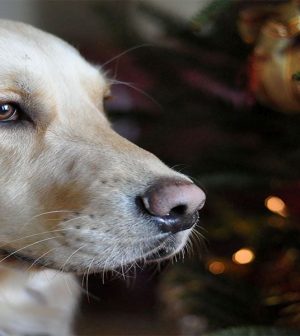- Could Your Grocery Store Meat Be Causing Recurring UTIs?
- Are You Making This Expensive Thermostat Error This Winter?
- Recognizing the Signs of Hypothyroidism
- 10 Strategies to Overcome Insomnia
- Could Artificial Sweeteners Be Aging the Brain Faster?
- Techniques for Soothing Your Nervous System
- Does the Water in Your House Smell Funny? Here’s Why
- Can a Daily Dose of Apple Cider Vinegar Actually Aid Weight Loss?
- 6 Health Beverages That Can Actually Spike Your Blood Sugar
- Treatment Options for Social Anxiety Disorder
Holiday Foods You Need to Keep Away From Your Pets

The holidays are all about treats and most pets are thrilled to partake in the indulging, but some foods you might give them could make them sick or worse.
“Pets tend to get more treats at holiday time — from their owners or from houseguests — which can put them at risk for health issues ranging from mild to life-threatening [think everything from a mild case of diarrhea all the way to spending the holiday taking your pet to the emergency room],” said Lisa Freeman, a veterinary nutritionist and professor at Tufts University’s Cummings School of Veterinary Medicine in Boston. “You may want to buy your pet a special holiday treat as a present or give them some of the holiday meal, but it’s important to think carefully about what you offer them.”
Luckily, Freeman has plenty of advice on how to keep your pets safe during the season of treat-giving.
First, there are foods that are downright dangerous for your pets: chocolate, grapes, raisins, xylitol (found in sugar-free gum and in candy or baked goods), onions, garlic, bones (raw or cooked), high-fat foods like roast beef, lamb chops or ice cream), raw meat, macadamia nuts and avocado.
But you also have to watch out for the trimmings: Wooden skewers or the string used to tie roasts can be very dangerous to pets if eaten, Freeman noted.
The best way to keep such foods from your pets is to make sure your furry friends can’t find their way into the trash, and pay close attention to foods on the counter or table before and after cooking.
It’s not unusual for veterinary emergency rooms to see a pet that grabbed a holiday turkey or ham while no one was looking. Pets also can steal cookies, chocolates, pies and other dishes, so keep those foods out of their reach.
If you do want to give your pet a special treat, there are a few guidelines, Freeman said.
First, exercise portion control for your pet’s sake. A cookie or piece of turkey that you give to your dog might seem reasonable, but that amount could be the equivalent of a human eating a Big Mac, Freeman noted. Dogs and cats are usually thrilled to get a special treat, no matter the portion, so go small.
Treats should account for less than 10% of your dog or cat’s total daily calories, she stressed. For example, an active 25-pound dog needs about 600 calories daily, so they should get no more than 60 calories daily from treats. meanwhile, a 10-pound cat typically needs just over 200 calories daily, so that means no more than 20 calories daily from treats.
What treats are good for them? Most fruits and vegetables make great treats for dogs. That includes apples, pumpkin, banana, strawberries, blueberries, melon, carrots, corn and green beans. Just avoid vegetables loaded with butter, sauces, salt and other seasonings.
A small amount of cooked turkey breast is usually a good option, but watch the portion (For cooked turkey breast, ¼ cup has about 50 calories). A small spoonful of the apple or pumpkin filling from a pie is also a reasonable treat for healthy dogs.
If your pet has medical issues, watch extra treats, Freeman added.
For example, many holiday foods are high in salt, which can be a concern for pets with heart disease, while dogs and cats with kidney disease need to be careful of phosphorus (high in meat and dairy products) and sodium.
In addition, pets with digestive issues can easily experience diarrhea or vomiting when given foods they don’t typically eat or high-fat foods.
Last but not least, tell your guests the “house rules” about treats, especially if your pet has a medical condition. Better safe than sorry, Freeman said.
More information
Visit the the University of California, Davis’ School of Veterinary Medicine for more on pets and treats.
SOURCE: Tufts University, news release, Dec. 8, 2023
Source: HealthDay
Copyright © 2026 HealthDay. All rights reserved.










